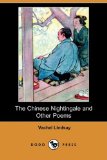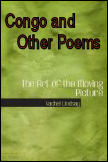"I feel that a guy who walked across the country performing and distributing copies of his poetry in exchange for bed and board belongs on your site unless he was advance man for Adolph Hitler. The background material you sent me also indicates that the guy was no racist.
The poem itself? I suppose parts of it could be considered racist, but so could most gangsta rap. If there is any controversy, it might be because Lindsay was white--but disallowing a white author to write on black subjects/ in black idioms means there can be no mingling and cross fertilization of voices--and you can't stop it anyway.
I think (treading on dangerous ground here, and espressing something that as a poet I always get mad at other people for doing to my work)

 Vachel was trying as well as could - a white poet from Springfield, Illinois - to write in a voice similar to Jean Toomer in CANE or Langston Hughes's early work for example. The 1910's and 1920's were a time of great appreciation or appropriation of African and African American voices, subjects, etc in the arts, especially in the music--ragtime, jazz, dance etc--see Dixieland, New Orleans Jazz, the Blues, Louis Armstrong, and Josephine Baker. It seems he was caught up, excited, in the grip of this spirit when he did it. I think Hart Crane did a short one like it called "Black Tambourine".
Vachel was trying as well as could - a white poet from Springfield, Illinois - to write in a voice similar to Jean Toomer in CANE or Langston Hughes's early work for example. The 1910's and 1920's were a time of great appreciation or appropriation of African and African American voices, subjects, etc in the arts, especially in the music--ragtime, jazz, dance etc--see Dixieland, New Orleans Jazz, the Blues, Louis Armstrong, and Josephine Baker. It seems he was caught up, excited, in the grip of this spirit when he did it. I think Hart Crane did a short one like it called "Black Tambourine".
If Lindsay fails in any way, it is because he spoke in the context of his times and because of the limited, sensationalized ideas/pictures of Africa or Africans.
...I don't know if you know comix, but one of my favorites is Wil Eisner's THE SPIRIT.

 It ran from 1940-1954 and featured a Buckwheat-like character named Ebony White. Though considered a parody today next to BOONDOCKS, Ebony was, for the times, a sympathetically depicted character. To sum up, I'd say give him the page. He is part of the American literary canon.
It ran from 1940-1954 and featured a Buckwheat-like character named Ebony White. Though considered a parody today next to BOONDOCKS, Ebony was, for the times, a sympathetically depicted character. To sum up, I'd say give him the page. He is part of the American literary canon.
...Let me go you one further. I reread 'The Congo" last night. One method of composing poetry is comparable to making a mosaic (mosaicry?). Often the poet will first set his form, and then select and reject his words, the mosaic pieces or tesserae, placing them where needed.
I would have used different words in places than Lindsay, probably retitled a couple of sections and maybe changed up the ending. Maybe. I am still getting aftertastes and possible multiple nuaces on some of his vamps that is the mark of great poetry.
But, further, let me say this. I have worked very hard for years to get the rhythm he had here; the rhythm which in this case serves as the frame of the mosaic.
He, like Gershwin, like Elvis, like Jerry Lee Lewis (hear riff), like the Stones and others, had got hold of that jazz/blues/gospel style ryhthm.
I don't think young rappers are copying or expanding on Linsay -- I had heard the name but never read any of his stuff that I know until now. But in his poetry, he was partaking of a rhythmic stream of consciousness, soul canon, songbook, whatever you will, that they are drinking from now.
As I said, this is a voice, as you could tell by my work, that I have worked to use. To see that somebody was working in it almost 80 years ago is gratifying, and shows I am on the right track, and in mining in the vein of a well-settled school of literature.
"
